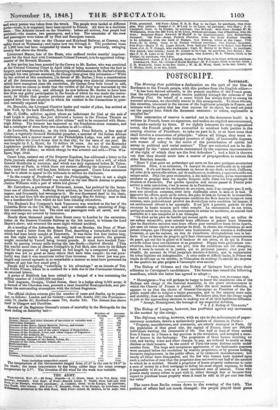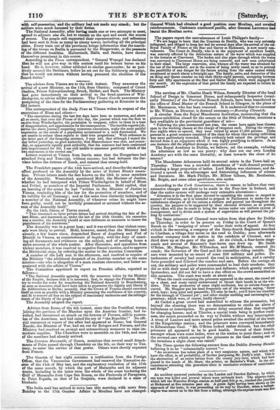The news from Berlin comes down to the evening of
the 14th. The position of affairs had not much changed: the people played their game with self-possession and the military had not made any attack; but the soldiers were much harassed by their duties.
The National Assembly, after havicg made one or two attempts to meet, agreed to adjourn sine die, but to remain on the spot and await the course of events. The people still supported their representatives; and adhesions had been sent in from as many as ninety towns, including all the principal cities. Every train out of the provinces brings information that the march- ing of the troops on Berlin is prevented by the Bargetwehr, or the peasants of the different localities. Halberstadt, Halle, and Stettin, have shown themselves prominent in this course.
According to the Times correspondent, "General Wrangel has declared that he will not give way in this contest until his helmet burns on his head. He is, however, rather addicted to similar gasconades: he as posi- tively assured the Stettiners, before he set out for the Schleswig campaign, that he would not return without having procured the abolition of the BOtucl-duties."
The acivices from Vienna are to the 12th instant. They announce the arrival of a new Ministry, on the 11th, from Olmiitz; composed of Count Stallion, Prince Schwartzenberg, Bruck, Helfert, and Bach. The Ministry had gone immediately on their arrival to the head-quarters of Win- dischgriitz, to advise milder measures. The Vienna Gazette announces the postponing of the time for the Parliamentary gathering at Kremsier to the 22d instant.
The correspondent of the Daily News at Vienna writes in respect of the executions of Blum and others-
" The executions during the last few days have been so numerous, and above all BO secret, that even the Presse of this day, the journal which was the first to receive from Windischgratz the permission to reappear, refers to them in a tone of disapprobation, and apprehension for the consequences. 'The terrible reports(ob- serves the above journal) respecting numerous executions, make the most painful impression on the minds of a population accustomed to a mild domination. We are unable to reduce these reports to their true proportions.' With reference to the latter part of the foregoing sentence I may add, that although I stated the day before yesterday, on good authority, Messenhauser was shot, and yester- day, on apparently equally good authority, that his sentence had been commuted into imprisonment for life, lain still unable to announce positively which of the two statements is the correct one."
Letters received at Vienna from Servia state that the Hungarians had attacked Swig and Temezigt, without success; but had defeated the Ser- Thins before the fortress of Essek, and entered that strong-hold.
The Frankfort papers of the 14th have arrived, and describe the startling effect produced on the Assembly by the news of Robert Blum's execu- tion. Private letters made the fact known on the 13th to some members of the Assembly. Wesendonk questioned Mohl, the Minister of Justice, whether he had interposed with Prince Windischgratz in behalf of Blum and Friibel, as members of the Imperial Parliament. Mohl replied, that on learning of the arrest he had "written to the Minister of Justice in Vienna, reminding him of the law for the protection of members, and of its validity for all Germany; and at the same time distinctly insisting that a member of the National Assembly, of whatever crime he might have been guilty, could not be lawfully prosecuted or arrested without the as- sent of the Assembly itself:"
On the 14th, Simon of Treves moved, "That inasmuch as three private letters had arrived detailing the fate of Ro- bert Blum and inasmuch as, under the law of the 10th October, his execution was a murder, the Assembly should at once deliberate on measures to insure the punishment of his murderers."
The Assembly was in a great heat; and it was evident that violent conn- MU were likely to prevail. Mohl, however, stated, that the Ministry had already, a few hours since, despatched Bauer of Augsburg and Posl of Munich to Vienna, as commissioners of inquiry, with the duty of exact- ing all documents and evidences on the subject, and of sending home a strict account of the whole matter. After discussion, and opposition from violent members, it was resolved to negative Simon's motion, and to approve the Ministerial steps' by referring the matter to the Austrian Committee.
A number of the Left met in the afternoon, and resolved to require of the Ministry "the additional despatch of an Austrian member on the same mission—one who is altogether of a more resolute character, and better ac- quainted with the affairs of Vienna."
The Committee appointed to report on Prussian affairs, reported as follows- " The National Assembly agreeing with the measures taken by the Ministry of the Empire, declares that it is necessary, first, to engage the Prussian Minis- try to revoke the order for transferring the National Assembly to Brandenburg, as soon as measures shall have been taken to guarantee the dignity and liberty of its deliberations at Berlin; secondly, that the Crown of Prussia should surround itself as soon as possible with a Ministry possessing the confidence of the country, and fit to remove all fear on the subject of reactionary tendencies and the infringe- ments of the liberty of the people."
The Assembly adopted the report.



























 Previous page
Previous page